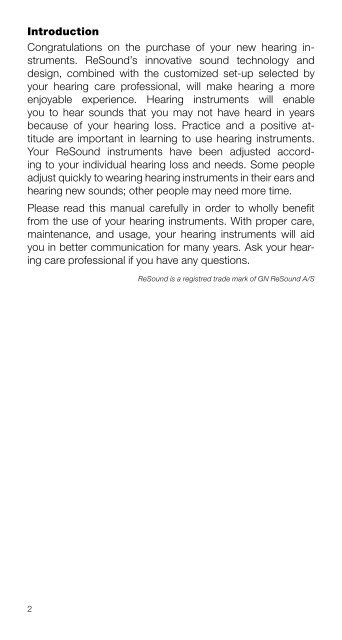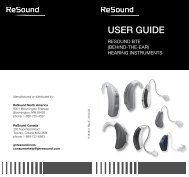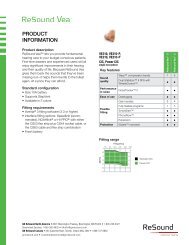ReSound Vea Behind-the-Ear (BTE) User Guide
ReSound Vea Behind-the-Ear (BTE) User Guide
ReSound Vea Behind-the-Ear (BTE) User Guide
Create successful ePaper yourself
Turn your PDF publications into a flip-book with our unique Google optimized e-Paper software.
introduction<br />
Congratulations on <strong>the</strong> purchase of your new hearing instruments.<br />
<strong>ReSound</strong>’s innovative sound technology and<br />
design, combined with <strong>the</strong> customized set-up selected by<br />
your hearing care professional, will make hearing a more<br />
enjoyable experience. Hearing instruments will enable<br />
you to hear sounds that you may not have heard in years<br />
because of your hearing loss. Practice and a positive attitude<br />
are important in learning to use hearing instruments.<br />
Your <strong>ReSound</strong> instruments have been adjusted according<br />
to your individual hearing loss and needs. Some people<br />
adjust quickly to wearing hearing instruments in <strong>the</strong>ir ears and<br />
hearing new sounds; o<strong>the</strong>r people may need more time.<br />
Please read this manual carefully in order to wholly benefit<br />
from <strong>the</strong> use of your hearing instruments. With proper care,<br />
maintenance, and usage, your hearing instruments will aid<br />
you in better communication for many years. Ask your hearing<br />
care professional if you have any questions.<br />
<strong>ReSound</strong> is a registred trade mark of GN <strong>ReSound</strong> A/S<br />
intended use<br />
Generic air-conduction hearing instruments are wearable<br />
sound-amplifying devices intended to compensate for impaired<br />
hearing. The fundamental operating principle of hearing<br />
instruments is to receive, amplify, and transfer sound to<br />
<strong>the</strong> ear drum of a hearing impaired person.<br />
Notice:<br />
1. A hearing aid will not restore normal hearing and will not<br />
prevent or improve a hearing impairment resulting from organic<br />
conditions.<br />
2. Consistent use of <strong>the</strong> aid is recommended. In most cases,<br />
infrequent use does not permit you to attain full benefit<br />
from it.<br />
3. The use of a hearing aid is only part of hearing rehabilitation<br />
and may need to be supplemented by auditory training and<br />
instructions in lip-reading.<br />
important notice for Prospective hearing aid users<br />
Good health practice requires that a person with a hearing<br />
loss have a medical evaluation by a licensed physician (preferably<br />
a physician who specializes in diseases of <strong>the</strong> ear) before<br />
purchasing a hearing aid. Licensed physicians who specialize<br />
in diseases of <strong>the</strong> ear are often referred to as otolaryngologists,<br />
otologists or otorhinolaryngologists. The purpose of<br />
<strong>the</strong> medical evaluation is to assure that all medically treatable<br />
conditions that may affect hearing are identified and treated<br />
before <strong>the</strong> hearing aid is purchased.Following <strong>the</strong> medical<br />
evaluation, <strong>the</strong> physician will give you a written statement that<br />
states that your hearing loss has been medically evaluated<br />
and that you may be considered a candidate for a hearing<br />
aid. The physician will refer you to an audiologist or a hearing<br />
aid dispenser, as appropriate, for a hearing aid evaluation.The<br />
audiologist or hearing aid dispenser will conduct a<br />
hearing aid evaluation to assess your ability to hear with and<br />
without a hearing aid. The hearing aid evaluation will enable<br />
<strong>the</strong> audiologist or dispenser to select and fit a hearing aid<br />
to your individual needs.If you have reservations about your<br />
ability to adapt to amplification, you should inquire about <strong>the</strong><br />
availability of a trial-rental or purchase-option program. Many<br />
hearing aid dispensers now offer programs that permit you<br />
to wear a hearing aid for a period of time for a nominal fee<br />
after which you may decide if you want to purchase <strong>the</strong> hear-<br />
2 3





